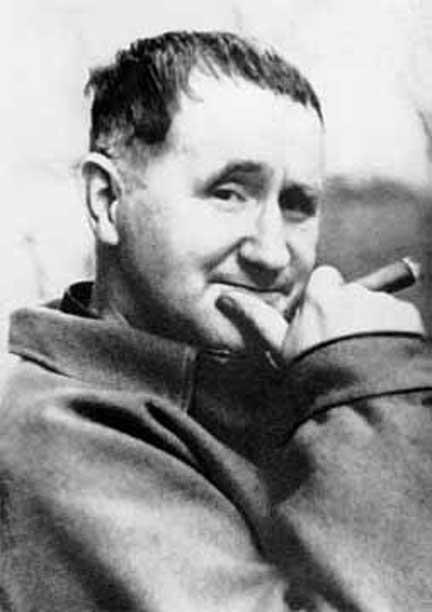Books |
Bertolt Brecht: Selected Poems
By
Published: May 09, 2017
Category:
Poetry
You know that Bertolt Brecht was a playwright.
What about his poems?
News to you, you say.
Not really — you know some of them. Like:
Or how about:
The fact is, Brecht was a prolific poet. A popular poet. And one who has surprising relevance now.
If you know anything about Bertolt Brecht, that has to sound like a wild stretch. Though not a Communist, he was a lifelong Marxist who seemed to enjoy East Berlin much more than Los Angeles. He resisted personal hygiene and reportedly stank like a badger. And yet — go figger — he leapt from bed to bed. And from home to home. As he says, “We changed countries more often than we changed our shoes.”
As a playwright, Brecht disliked emotion; his goal was to make audiences think. In his poems, though, he could balance rationality and emotion. In “Parting,” he could even acknowledge — and work around — political differences and the irony that his prominence has made him economically comfortable:
We embrace.
Rich cloth under my fingers
While yours touch poor fabric.
A quick embrace
You were invited for dinner
While the minions of law are after me.
We talk about the weather and our
Lasting friendship. Anything else
Would be too bitter.
Looking back, Brecht seems less like a radical, more like … well, some of us. You could almost say that the writer who died in 1956 is a citizen of the 21st century. [To buy Brecht’s “Selected Poems” from Amazon, click here.] How? First, he had no use for the writer as solitary hero. Or of solitary heroes of any kind, which he viewed — as some of us do — as media creations. As he wrote:
The young Alexander conquered India.
Was he alone?
Caesar beat the Gauls.
Did he not have even a cook with him?
Philip of Spain wept when his armada
Went down. Was he the only one to weep?
Frederick the Second won the Seven Year’s War. Who
Else won it?
Every page a victory.
Who cooked the feast for the victors?
Every ten years a great man?
Who paid the bill?
Who pays the bill?
We have come to know what Brecht knew: the little people. They are Brecht’s great concern, and now, thanks more to the Internet than any other media, we can’t help but be aware of them. The poor. The hungry. The old and shoved aside. Kids. And you can say, yeah, but he had a radical point-of-view about the disenfranchised and overlooked. Well, how radical, really, is this: “First feed the face. Then talk right and wrong.”
The theme Brecht is largely working out in his poems — see if this doesn’t resonate a little for you — is just as simple: How do you live an ethical life in a corrupt society?
A tricky question. For one thing, it’s easy to be self-righteous about Other People — and still pay a price:
Even the hatred of squalor
Makes the brow grow stern.
Even anger against injustice
Makes the voice grow harsh. Alas, we
Who wished to lay the foundations of kindness
Could not ourselves be kind.
For me, it’s this willingness to be as hard on himself as he is on those who keep The People down that makes Brecht much more than a propagandist. How often, for example, have you felt like this:
Traveling in a comfortable car
Down a rainy road in the country
We saw a ragged fellow at nightfall
Signal to us for a ride, with a low bow.
We had a roof and we had room and we drove on
And we heard me say, in a grumpy voice: No,
we can’t take anyone with us.
We had gone on a long way, perhaps a day’s march
When suddenly I was shocked by this voice of mine
This behavior of mine and this
Whole world.
If the role of the poet is to articulate thoughts and emotions we share but cannot say, Bertolt Brecht is an important poet. Shockingly accessible. Surprisingly touching. And, more often than you might have thought, a chronicler of anxieties very much like ours.
Consider this: In 1939, Brecht wrote “To Those Who Follow in Our Wake.” [To read it all, click here.] Some excerpts…
I would happily be wise.
The old books teach us what wisdom is:
To retreat from the strife of the world
To live out the brief time that is your lot
Without fear
To make your way without violence
To repay evil with good —
The wise do not seek to satisfy their desires,
But to forget them.
But I cannot heed this:
Truly I live in dark times!
….
There was little I could do. But without me
The rulers sat more securely, or so I hoped.
And so passed
The time given to me on earth.
But you, when at last the time comes
That man can aid his fellow man,
Should think upon us
With leniency.


